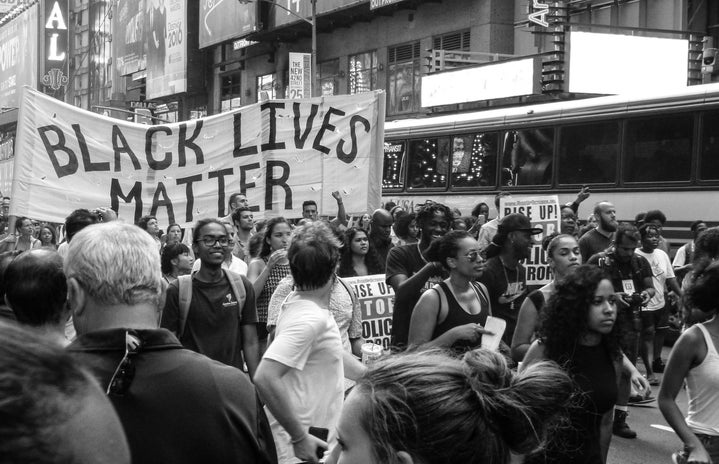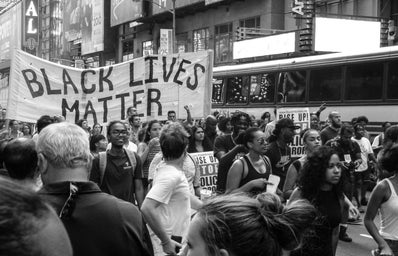Black History Month is the time of year when everyone looks to support and celebrate the Black community in many different ways. It could be shopping Black-owned businesses, getting involved on social media, or educating yourself on lesser-known, important Black figures. While doing all of these things is still great (and we should keep doing them!) this support shouldn’t end after February. Black excellence, Black bodies, and Black history is something to be celebrated year-round, and truly being a white ally to the Black community means putting in the work every day, not just a month.
We owe so much to the Black community, and while there’s nothing we can do to repaint history and change the way Black people have been consistently treated in the past, it is important to use our privilege every day to take steps towards building a new future. So, I’ve compiled a list of some things white allies can do to practice their allyship year-round rather than just committing to it once a year.
Educate yourself.
One of the best ways to be a great ally to the Black community is to continue learning and doing research. This not only means reading and learning more about the entirety of the Black experience, but also looking inwards and challenging our own assumptions or subconscious biases. It also means unlearning false and incomplete history that we’ve seen documented in our textbooks because much of what we were taught in elementary and middle school is whitewashed and not the full truth. Black history is history, so learning the truth about what it means to be Black in this country, and how the Black community has remained strong, beautiful, and proud, is one of the most important things we can do.
Many white allies often resort to asking people of color to explain racism and oppression, and even though this action is often well-intentioned, it’s placing a burden on these communities. So, it’s important to put in the work yourself. There’s a plethora of books, films, articles, and podcasts out there to help broaden your understanding of Black history and the Black experience. Here are some resources you can explore, but even something small like doing a Google search of terms you may not understand is a great place to start too. Just make sure not to abandon your research, and commit to doing it frequently.
Donate to Black organizations.
Not everyone has the resources and ability to donate money, and that’s completely okay! There are plenty of ways you can be a great ally, and donating is just one of them. However, if you have the ability to donate money to a Black-owned organization, you should. There are many uplifting organizations out there for the Black community, and it’s important to give what you can. The Loveland Foundation, founded by Rachel Cargle, brings “opportunity and healing to communities of color, and especially to Black women and girls,” hoping to contribute to the empowerment of their community. The Black Artists and Designers Guild works to give Black artists opportunities for exposure and networking as they are continuously underrepresented in the art and design industries. These are only two of hundreds of amazing nonprofit organizations doing meaningful work for the Black community. You can find more places to donate here and here.
Connect on social media.
As a member of Gen Z, I can admit to the fact that I spend way too much time on social media. However, I can make that time useful by filling up my feed with meaningful content, including Black creators, activists, and educational accounts. Here’s a great article that lists 30 Instagram accounts you can follow to change up your social media feed for the better.
Make an effort to diversify.
Many people have marginalized identities, and it’s important to recognize and support that as well. For example, when looking for ways to support the black community, try not to only focus that support on black men. Black women regularly experience both racism and sexism, and those who are black and identify with the LGBTQ+ community are experiencing marginalization at the intersection of racism, homophobia, anti-trans sentiment, and a number of other factors. Remember that being an ally means being an ally to the entirety of the Black community, so supporting organizations and initiatives that support this diversity is important.
You can check out this article for a number of services and groups supporting the Black LGBTQ+ community, and this one for those that are supporting Black women.
Use your privilege for good.
First, you need to be able to recognize and understand what white privilege means. Then, figure out how to use that privilege for good. Being an active bystander and speaking up when you notice casual racism is so necessary and something everyone should practice. You’ve probably heard racist remarks made everywhere, at work, at holiday dinners with family, in school, with friends, etc. So speaking up and educating the people in your circle when you know something isn’t right is one of the best things you can do as an ally. It can be difficult and tiring at first, and you’ll probably get it wrong a couple of times, but practicing will make this easier for you and will do a whole lot of good. Hollaback is a great place to start as they offer training and tools to help learn how to be an active bystander.
Keep going.
Take the momentum from Black History Month and stretch it to the rest of the year. The problem with deeming one month (keep in mind it’s also the shortest month) as a time to celebrate and uplift the Black community is that it gives people and brands an excuse to stop putting in the work after February ends. So, the most important thing we can do is work on being supporters and allies year-round. Keep learning, listening, and doing things that support people of color and make you a better ally so that others will catch on and do the same. I listed a number of resources throughout this article, but even doing a quick Google search on your own will pull up lots of information to check out and dive into. It doesn’t have to mean taking hours every day to read and sift through articles, but it could mean something as small as watching a movie with Black protagonists that highlights their stories or listening to an educational podcast on your walk to campus. The point is, there’s something you could do every day to strengthen your allyship, so why not do it?
I referenced the articles here and here for my own research in compiling this list, and Her Campus also has a bunch of great articles dedicated to Black History Month to keep reading up on it!


